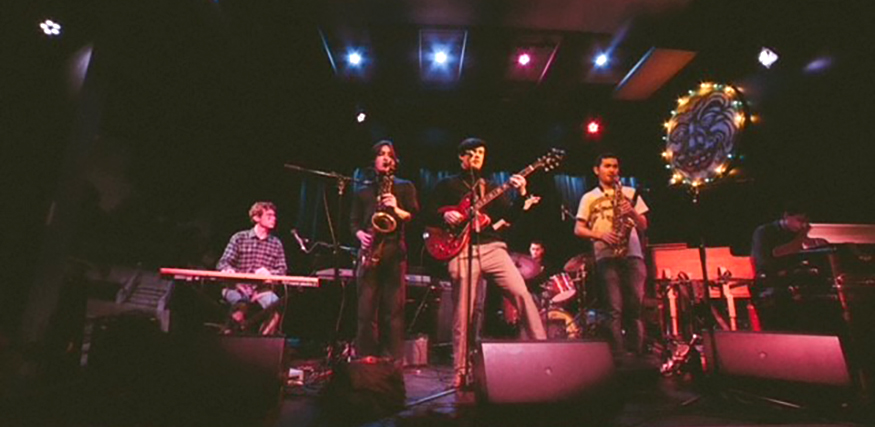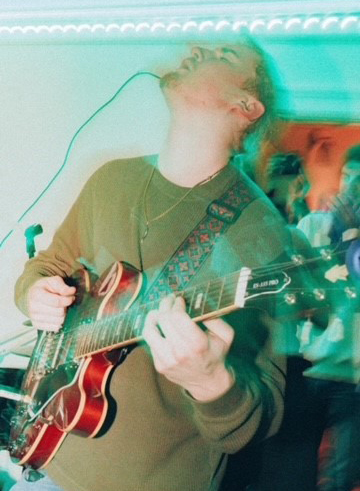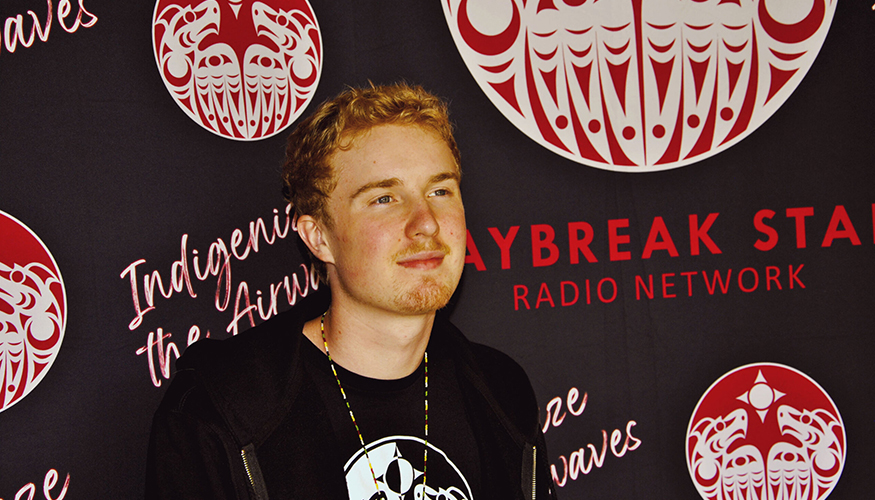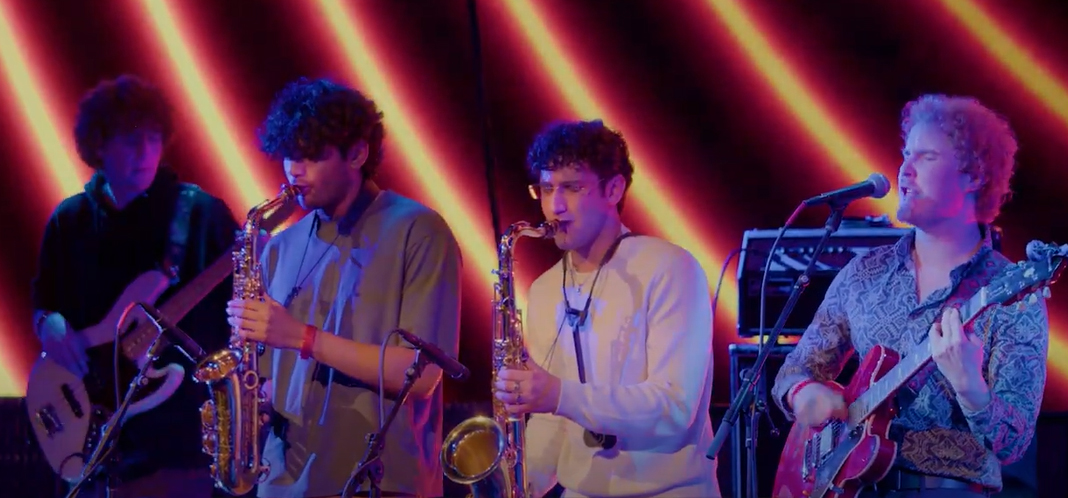
Markus Teuton (Cherokee Nation) spent years listening to bands perform at Seattle’s annual Folklife Festival. This May, he took the stage with his own band, Joint Souls. Made up of UW jazz musicians, Joint Souls performed songs written by Teuton.
“I’d been going to Folklife since I was a kid,” Teuton says of the milestone performance. “To be playing there as a performer was a full circle experience. It was surreal.”
Weeks after Folklife, Teuton reached another milestone: He graduated from the University of Washington, earning a double degree in jazz studies and comparative history of ideas in the College of Arts & Sciences. The two majors enabled Teuton to explore music from multiple perspectives, including performance, history, and culture. One area of particular interest has been contemporary Indigenous music.
The Importance of Individuality
Though Teuton plays lead guitar in Joint Souls, he had only a limited knowledge of guitar until high school, with a repertoire that consisted of three chords. Then he attended a performance of his high school’s award-winning jazz band and noticed guitar players on stage.
“I was like, ‘Wait a minute. You can play guitar for class?’” Teuton recalls of the concert at Seattle’s Roosevelt High School. “I gotta get with it.”

Teuton was told he’d be unlikely to reach the level of musicianship necessary to be accepted into the jazz band the next year, but he was undeterred. “I’m very ambitious,” he says. “When people tell me ‘no,’ I really put the pedal to the metal.” He was accepted into the high school jazz band, which led to his jazz studies major in the UW School of Music.
Although Teuton’s major has “jazz” in its title, his own music is not easily categorized. With musical heroes that include Jimi Hendrix, Wayne Shorter, John Coltrane, Joni Mitchell, Muddy Waters, Bobby Womack, and Curtis Mayfield, it’s no surprise that his own music blends jazz and soul, blues and rock. He credits jazz faculty at the UW, particularly professors Cuong Vu and Ted Poor, with encouraging him to develop his own cross-genre style.
“I really like that there’s strong encouragement to find your individuality, to find your voice in that way,” he says. “When you get to a certain point in musicianship, it’s not about who’s got more chops. It’s about having a voice of your own that adds something to the music.”
Teuton’s band reflects his voice. In 2022, he asked a few friends in the jazz studies program if they’d be willing to play some songs he had written. They recorded a single in a friend’s basement studio and decided to continue as a band. More musicians joined — Joint Souls now includes two horns, two keyboard players, drums, bass, guitar, and vocals — and the band eventually landed a gig at the Royal Room, a popular music venue in South Seattle, followed by a spring break tour in clubs along the West Coast. They have since performed at more Seattle venues, including the Mural Amphitheatre at the 2024 Folklife Festival.
Exploring Cultural Aspects of Music
While music has been central to Teuton’s life and UW experience, he also sought more reading- and writing-focused academic work. He chose a second major in comparative history of ideas (CHID), a degree program with an interdisciplinary emphasis. Students in CHID can shape the major to reflect their interests; Teuton focused on cultural aspects of music. He explored this topic globally — through his work with CHID's program in Lima, Peru on "The Arts of Politics" — and closer to home.
“As a citizen of Cherokee Nation, one of the things I wanted to learn more about was the intersection of Black American music and Native music, and how that informs the modernization of Native music,” Teuton says. “In CHID, I was able to learn more about the cultural and historical influences for both of these kinds of music.”
There’s a lot of Indigenous creativity, a lot of Indigenous genius out there. There are great musicians who should have recognition.
For his CHID senior thesis, Teuton created an avant-garde jazz version of the Feather Dance — a traditional song performed within the Cherokee Nation — and wrote a paper about the complexities of modernizing a traditional Indigenous song, including how that can play a role in cultural resurgence.
“It’s a nod to the past but also a leap forward to the future,” he says of his project, bringing traditional Indigenous music into conversation with jazz ideology. “I see revitalizing the music as a way of protecting the culture. It’s a way of taking those traditions, that musical language, and reviving and reinterpreting it to reflect what it means to people today.”
Celebrating Indigenous Musicians
Beyond his own music, Teuton is dedicated to highlighting the work of other Indigenous musicians. For the past two years, he has hosted “Indigenous Jazz,” a weekly program on Daybreak Star Radio. As host, he has spent untold hours seeking out music that can be hard to find. The station’s music library has increased from 3,000 to over 10,000 titles, but more importantly, Teuton has introduced new audiences to the work of many talented Indigenous jazz musicians.
“I feel like as Indigenous people, we’re not often represented in the media,” says Teuton. “I want to highlight our triumphs. There’s a lot of Indigenous creativity, a lot of Indigenous genius out there. There are great musicians who should have recognition. That’s what I wanted to do with the show.”

Teuton will continuing hosting “Indigenous Jazz” in the coming year. And he will continue as a student in the UW School of Music, now as a graduate student in the Ethnomusicology Program. His long-term goal is to pursue a PhD, with a focus on Indigenous music.
“There’s still so much yet to be written about what Native people are doing today within music. I’d like to see that literature be created,” he says of his decision to attend graduate school. “I thought, ‘Well, if not me, then who?’”
For Teuton, a major draw of the UW program is the opportunity to work with Indigenous jazz musician John-Carlos Perea, associate professor of ethnomusicology, whose interests include Native and African American jazz cultures. Teuton is excited to get started on this next chapter at the UW.
“I love doing music, but I also want to contribute to those intellectual conversations about music,” he says. “I want to be around that kind of community. At the UW, there’s just so much curiosity, so many interesting ideas flowing around. How could I not want to be around that?”
Watch Joint Souls perform "Hope is in my Hand" at MoPOP Sound Off! 2024. Video courtesy of Joint Souls.
More Stories

AI in the Classroom? For Faculty, It's Complicated
Three College of Arts & Sciences professors discuss the impact of AI on their teaching and on student learning. The consensus? It’s complicated.

What Students Really Think about AI
Arts & Sciences weigh in on their own use of AI and what they see as the benefits and drawbacks of AI use in undergraduate education more broadly.

A Love of Classics and Ballroom
Michael Seguin studied Classics at the UW and now owns Baltimore's Mobtown Ballroom. The two interests, he says, are more connected than they might seem.

